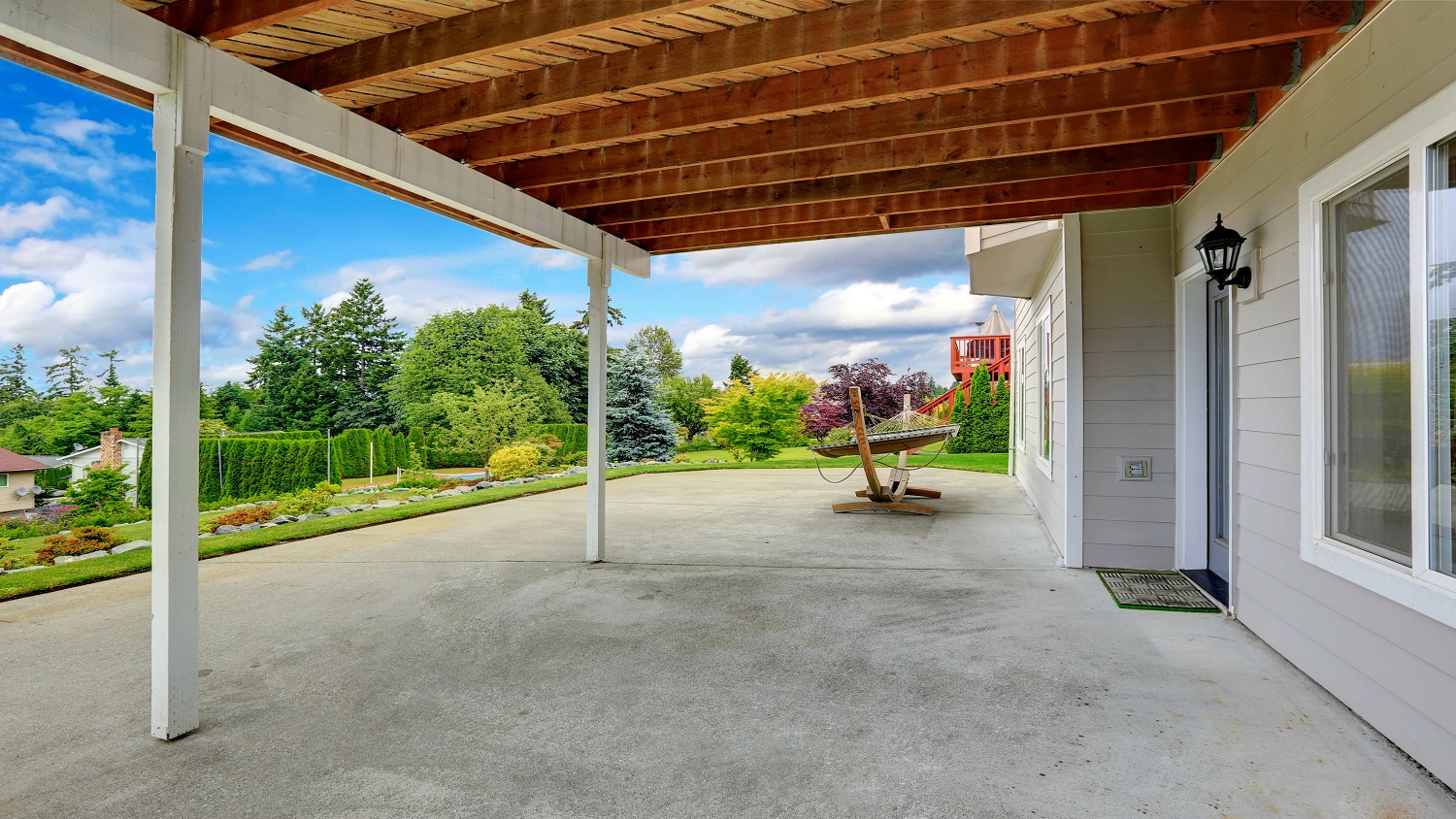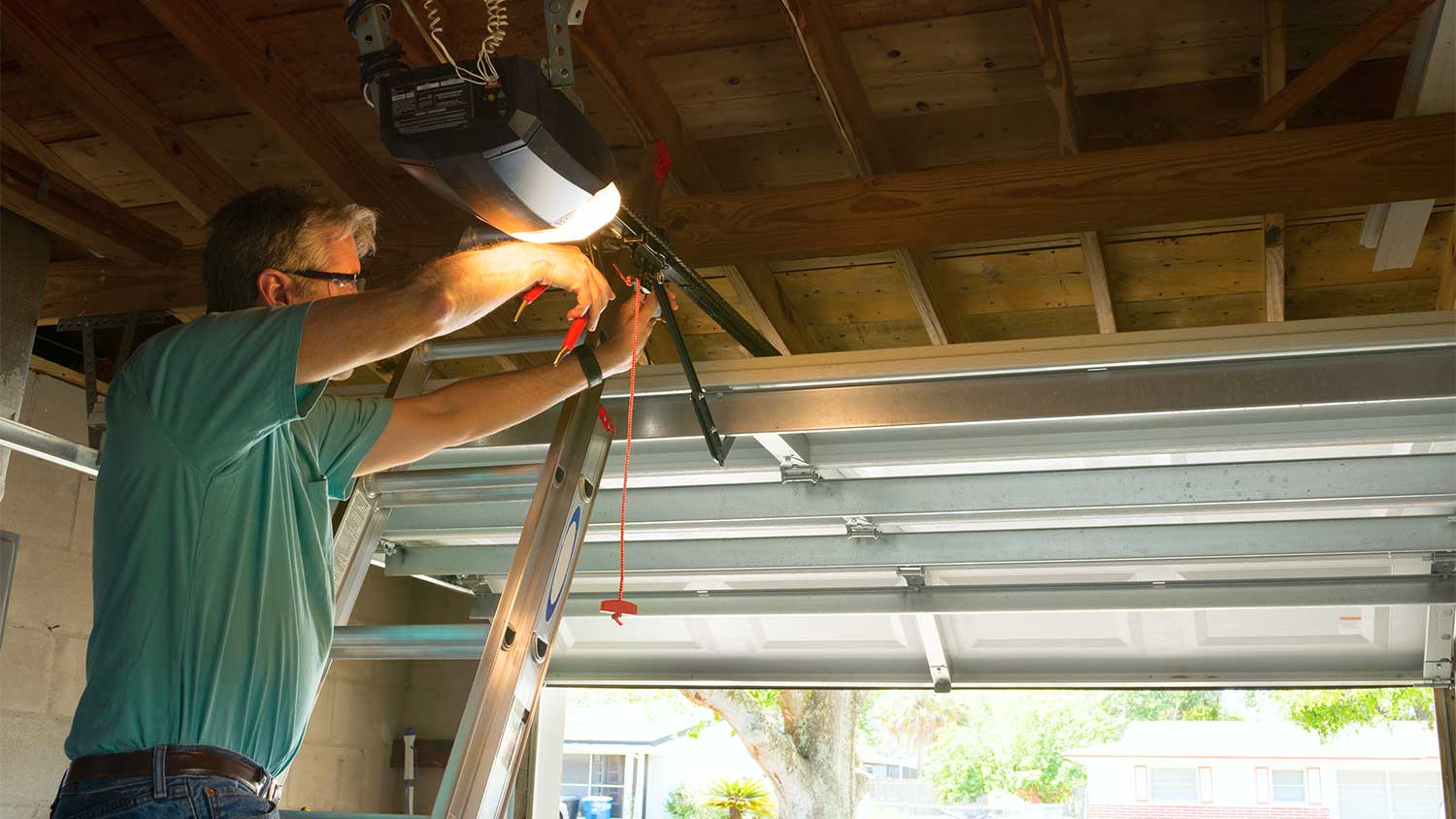
Use this guide to estimate the cost to build an RV garage based on its size, materials, and more.
Garage door repair costs an average of $264


On average, expect to spend between $155 and $378 for most garage door repair costs, with a national average of $264.
Garage door repair costs depend on the door's size, material, and the extent of the damage.
Oversized or heavily dented doors often need a bigger line item in the budget.
Book professional repairs promptly; quick fixes today are cheaper than replacements tomorrow.
This article was updated using automation technology and thoroughly reviewed for accuracy by HomeAdvisor Editor Ryan Noonan.
The average cost to repair a garage door is $264, with most prices ranging between $155 and $378. However, some repairs can be as low as $80 and may climb as high as $700 in some cases. The type and extent of damage, along with the door's size and design, significantly affect repair costs.
If the door has undergone extensive damage, replacement is often more cost-effective than repair. Set aside room in the budget and call a pro as soon as you spot a problem—quick action prevents bigger, costlier surprises down the road.
Various factors impact the total cost of a garage door repair, including the door size, the issue, the type of door, and labor.
Bigger doors mean beefier hardware and more time on site. Double-wide or insulated doors weigh more, so your pro may need to bring extra help or heavier-duty equipment, which can push labor costs toward the top of the range.
The price tag hinges on what went wrong. Simple jobs, such as reprogramming a remote, cost between $100 and $350, while sensor realignments range from $150 to $250. Tackling track damage or a burned-out motor can push the bill closer to $400. When one part fails, it can strain others; therefore, catching problems early helps keep costs down.

Your door’s design also plays a role. Basic single roll-up or tilt-up models are straightforward to service, but custom, multi-panel, or smart-enabled doors use specialized parts that cost more to replace and take longer to adjust.
| Door Type | Average Cost Range |
|---|---|
| Tilt-up | $150–$1,000 |
| Roll-up | $300–$800 |
| One panel | $400–$1,200 |
| Carriage | $1,000–$10,000 |
| Sectional | $150–$400 |
Garage door specialists charge $75 to $150 per hour. Most homeowners pay between $150 and $450 for labor, although a quick service call for a simple fix can cost just $50 to $75. Heavier doors, multiple broken parts, or emergency visits can add a few more labor hours to the invoice.
A garage door has many moving parts, each with varying repair costs. Most parts require replacement if they break, while some, such as the opener and track, can be adjusted or lubricated rather than replaced.
| Part | Average Cost Range |
|---|---|
| Springs | $180–$350 |
| Opener | $100–$500 |
| Cables | $100–$400 |
| Track | $5–$400 |
| Panel | $250–$1,000 |
| Glass | $100–$200 |
Broken springs are one of the most common—and dangerous—garage-door issues. Expect to spend $180 to $350 to replace them, depending on the spring type. Because springs hold hundreds of pounds of tension, leave this job to a pro.
Fixing a malfunctioning opener costs $100 to $500. Your final price depends on whether the pro can adjust a gear or must swap out the entire motor.
Cable repairs run $100 to $400. Heavier or solid-wood doors need thicker, higher-grade cables, so plan for the upper end of the range if your door is on the bulky side.
A track repair can cost as little as $5 for a basic bracket or up to $400 for a full track replacement. If a bent track allows the door to sag, address it quickly—the longer it persists, the more panels or rollers you may need to replace.
Before booking a repair, weigh the pros and cons of a full replacement. Minor problems, such as a faulty opener, a single damaged panel, or worn rollers, are quick fixes that a pro can address in a few hours and cost far less than replacing the hardware.
If your door is severely warped, requires frequent servicing, or has multiple failing components, replacing it often saves money in the long run. A pro can often remove the old door and hang the new one in under a day.
While repairing a garage door costs an average of $264, replacing one has an average replacement cost of $1,223. Schedule an assessment with a local garage door repair professional to determine the best approach for your garage door needs.
To keep your garage door repair budget-friendly, consider the following money-saving tips:
Handle straightforward jobs—like replacing a worn pulley—yourself if you have the right tools and feel confident.
Schedule service as soon as you hear grinding or notice uneven movement to prevent small problems from escalating.
Collect quotes from a few local pros to be sure you’re paying a fair rate.
Skip decorative add-ons and smart features if the goal is a budget-friendly repair.
No place is more important than your home, which is why HomeAdvisor connects homeowners with local pros to transform their houses into homes they love. To help homeowners prepare for their next project, HomeAdvisor provides readers with accurate cost data and follows strict editorial guidelines. We surveyed over 30,000 real customers about their project costs to develop the pricing data you see, so you can make the best decisions for you and your home. We pair this data with research from reputable sources, including the U.S. Bureau of Labor Statistics, academic journals, market studies, and interviews with industry experts—all to ensure our prices reflect real-world projects.
From average costs to expert advice, get all the answers you need to get your job done.

Use this guide to estimate the cost to build an RV garage based on its size, materials, and more.

Need to replace your garage door? Here’s how much it costs, what factors affect cost, and what to expect.

How much does it cost to build a garage? Explore cost factors, budgeting tips, and how a garage adds to your home’s value with our detailed cost guide.

Wondering who seals concrete? Learn who to hire, when DIY makes sense, and how pros seal driveways and garage floors—start your search now

Wondering who to hire for garage door repair or installation? See when to call a garage door installer or technician and what to ask.

Discover who to hire to build a garage. Learn whether to hire a general contractor or garage builder, what to expect, and how much it costs.